You are using an out of date browser. It may not display this or other websites correctly.
You should upgrade or use an alternative browser.
You should upgrade or use an alternative browser.
The Land of Freedom
- Thread starter Asami
- Start date
Although seeing an italian Napoleon is refreshing, isn't Napoleon like, 18 when he takes the purple? His age here is the only thing i have a problem with.......
Asami
Banned
Although seeing an italian Napoleon is refreshing, isn't Napoleon like, 18 when he takes the purple? His age here is the only thing i have a problem with.......
Indeed, however, the ambitious lad has won over many friends. He's inexperienced, that much is true.
Asami
Banned
Chapter Four: The Birth of a Republic
Excerpt taken from The Birth of a Republic
Author: George Langbroek, Curator of the Washingtonian Museum in Washington City
Published:1989
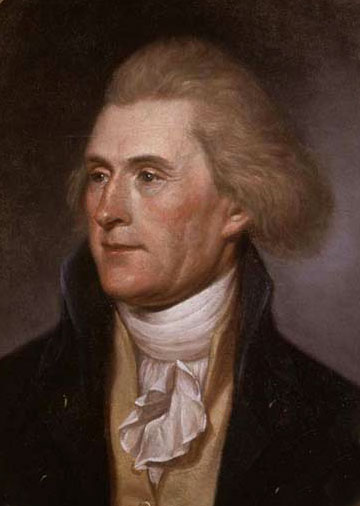
Thomas Jefferson, First President of Georgia
Independence
In July 1795, Georgia experienced a visit from a collection of exiles from the mother country. Various high level aristocrats, nobles from within the republic, merchants, and both naval and army officers arrived in a manner similar to the Amerikaners.
The leader of the Dutch, Willem van Oranje-Nassau, former leader of the United Provinces before it's fall, entered Cape Town and demanded it's submission to his authority as leader of the country. This did not go over well with many, especially the Amerikaners.
Thomas Jefferson and his Boer and Amerikaner associates, had been gathering in Cape Town with the concurrent administrator, whose name has fallen to history since 1795. Willem and his "Orangists" demanded Jefferson's compliance, along with that of his associates. The stand-off between the Amerikaners and Boers continued for several days before Britain arrived off the shores of South Africa.
The British diplomat came ashore to Cape Town and issued a statement from His Majesty. The colony of South Africa was to be handed over to the British Empire immediately, and all Amerikaner "wanted persons" were to be handed over immediately to face pending justice that had been denied some decade prior.
William conversed with his men for a short time, before also conversing with Jefferson and John/Johan Adams. In the end, William sided with the Amerikaners and Boers, and refused Britain's request. The small naval detachment belonging to the Dutch exiles attacked the small British naval task-force assigned to take over the Cape, and sank it.
On July 4, 1795, Thomas Jefferson and the National Assembly which had formed, issued the Declaration of Independence; similar to the one written in 1776, this one, however, was worded differently, instead of speaking out against a tyrannical overlord, this instead spoke out against the threats that beheaved Europe and the world. Namely, French radicalism and British imperialism. Willem, still acting in capacity as the exiled Dutch leader, gave his assent to the independence of Georgia. France, when word reached them, declared the independence of Georgia to be false, as it was their colony, but they took no action against them.
However, this newly independent Georgia suddenly received massive outpour of support from Austria and Italy. Napoleone's Italy immediately recognized the independence of Georgia, as did the Dutch exile government, which took refuge in Cape Town.
Britain was initially tempted to go to war with the Cape, but a French raid on Britain's coastlines forced them to abstain from a war against Georgia, but Britain's distaste for this state was not completely gone.
Die Konvensie van 1795
After the Declaration of Independence, the newly independent Georgia held a Constitutional Convention to debate government. Without issue, the form of government was indeed decided to be a federal republic. The Georgians wanted nothing to do with monarchy anymore, that much was clear.
More problematic was the discussion over African rights -- while the American colonies had issues with race, the southerners being adamant about slavery, that did not exist in Georgia; the country was small, and slavery wasn't really a thing, beyond a couple hundred slaves. The biggest question was, should African aborigines be given constitutional rights?
Jefferson was a strong proponent of giving it to them -- stating that if Georgia wished to make itself a power to be reckoned with, it would have to expand into the interior, and even then, it couldn't oppress the aborigines -- they would one day outnumber them, instead, he stated, cultural assimilation was the answer. The delegates of the meeting were in agreement about this, and the agreement was easy.
Slavery was a five minute discussion -- it would never be permitted. Jefferson had held slaves during his time in America, but he did not wish to allow that system to perpetuate, especially as he had been far too reluctant of a slave holder. Many Patriots and moderate Boers agreed with this interpretation, and agreed.
The largest and stickiest discussion between the delegates was the power of the executive -- the President of Georgia. Jefferson and his "Vryheid Party" advocated a stronger executive office, while Adams and his "Konfederasie Party" advocated a weaker executive, and more power to the provinces. The debate carried on longer than all others, but Jefferson expressed that without a strong central government, the state would lack the capacity to do many things, however, he also stated that the state still had duties to the provinces and would grant them right to operate under their own within the law.
This debate lead to the Constitutional Convention voting on Jefferson's proposal. After another week of debating, they determined that starting in January 1796, every five years, elections would be held to determine the President. Every three years, all members of Parliament would be up for re-election. And after the election, every President would be sworn in on April 1st. The election system would be, until the country grew and expanded, determined by direct voting -- the person with the most votes would win. Proposals for a some sort of arbitrary system where each province would get a number of electoral votes was rejected after being considered "ridiculous".
The very final piece of negotiation was of course, the flag. The flag was created by a Boer artisan, and was approved with very little dissent.
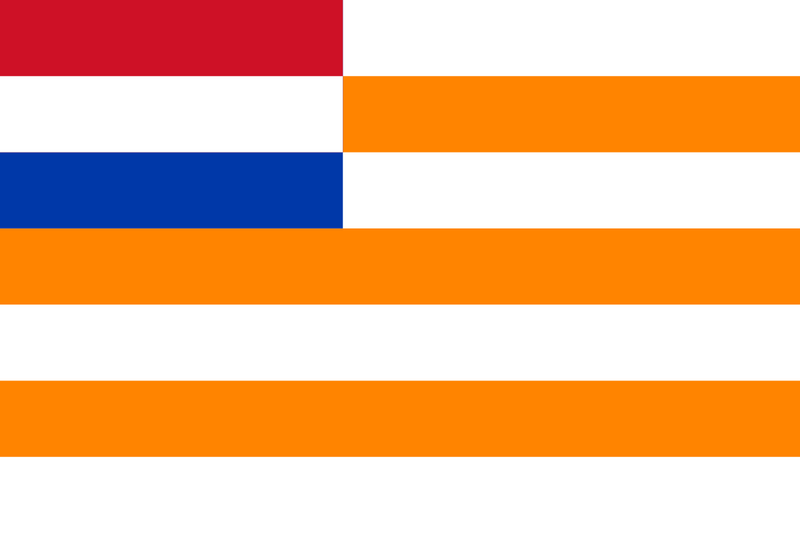
Flag of the Republic of Georgia
Presidentsverkiezingen van 1796 / Presidential Election of 1796
The first election of Georgia was monumentous. Before the arrival of the Amerikaners, the Dutch Cape Colony had a population of about 60,000. After their arrival, and the arrival of the Dutch exiles, that population had swelled to just over 73,000 people. The first Georgian census had the population at 73,244. The parliament was convened with 74 seats, one per one thousand people in the country, with an extra seat rollover.
The 1796 election saw the pitting of Thomas Jefferson's Vryheid Party, against Adams' "Nasionale Demokratiese Party", which had renamed itself after the defeat of Adams' Confederate proposal.

Thomas Jefferson (Vryheid) - 62,584 votes
Johan Adams (ND) - 10,660 votes
The election result saw Jefferson winning plurality in all the four provinces, winning 62,584 votes, to Adams' 10,660. Jefferson was inaugurated as President of Georgia on April 1, 1796, to much cheer. Because there was no national anthem yet, many Boers sang Het Wilhelmus. The day of the inauguration, a proposal entered Parliament to make an instrumental version of that song the national anthem. However, several Amerikaners proposed writing a new anthem. This early debate would be interesting for the state.
One of the first things done besides the anthem debate, was the Settlement Act of 1796, which proposed claiming and settling a certain region of Southern Africa for the Georgian state. Cartographers in Cape Town organized this means, and an expedition went east to look at how far they should claim.
As the first President, Jefferson was responsible for the future of the state, and he took his responsibility seriously. But for the first time, the Boers and Amerikaners looked forward to the future.
Last edited:
Very nice work so far, it's good to see the Boers and Amerikaners working together so well and so early. AIUI that actually shouldn't be so surprising once the language gap gets closed (even if only in government circles), given a similar basis in Protestant work ethics, similar frontierist attitudes and a mutual dislike for London. However, two things I wanna touch on real quick:
1) I'm not sure the British task force would've been sunk, as that act in the sense of destroying ships permanently wasn't a typical goal back then. It was usually a matter of capturing or seeing off the enemy ship, barring the occasional exception here and there, seeking to sink a ship was not only unconventional but hard to practically do.
2) No slaves in South Africa? I beg to differ. Attitudes may be different in the applicable quarters regarding chattel slavery as an institution, but you're gonna have a bunch of people living there with attitudes which, by modern standards, are racist no matter what, 'twas the reality of European thought at the time (even if not expressed with hostility). Now that can change, but it won't be upon setting foot in Africa or even the next few years afterwards. If you have more people like Adams and THIS wonderful Patriot fellow in the place, maybe you can get somewhere with that (and yes, I know where the latter guy's from, but then again I'm not convinced it'll be exclusively Northerners and Virginians moving there as said before, just that they'll be the majority of the Exodus' overall populace).
1) I'm not sure the British task force would've been sunk, as that act in the sense of destroying ships permanently wasn't a typical goal back then. It was usually a matter of capturing or seeing off the enemy ship, barring the occasional exception here and there, seeking to sink a ship was not only unconventional but hard to practically do.
2) No slaves in South Africa? I beg to differ. Attitudes may be different in the applicable quarters regarding chattel slavery as an institution, but you're gonna have a bunch of people living there with attitudes which, by modern standards, are racist no matter what, 'twas the reality of European thought at the time (even if not expressed with hostility). Now that can change, but it won't be upon setting foot in Africa or even the next few years afterwards. If you have more people like Adams and THIS wonderful Patriot fellow in the place, maybe you can get somewhere with that (and yes, I know where the latter guy's from, but then again I'm not convinced it'll be exclusively Northerners and Virginians moving there as said before, just that they'll be the majority of the Exodus' overall populace).
Last edited:
2) No slaves in South Africa? I beg to differ. Attitudes may be different in the applicable quarters regarding chattel slavery as an institution, but you're gonna have a bunch of people living there with attitudes which, by modern standards, are racist no matter what, 'twas the reality of European thought at the time (even if not expressed with hostility).
Yes, I brought this up at the beginning, and I'll bring it up again. The premise of this TL intrigues me, and I am a big fan of the Founding Fathers of the United States (Thomas Jefferson and Benjamin Franklin in particular--two people fully deserving to be called Renaissance men), but to think that no slaves would be brought over, and no new slaves taken there seems very unlikely.
Jefferson is a Federalist and Adams is a Democratic-Republican?
Did i just see that right?
Did i just see that right?
Asami
Banned
Yes, I brought this up at the beginning, and I'll bring it up again. The premise of this TL intrigues me, and I am a big fan of the Founding Fathers of the United States (Thomas Jefferson and Benjamin Franklin in particular--two people fully deserving to be called Renaissance men), but to think that no slaves would be brought over, and no new slaves taken there seems very unlikely.
I feel that the number of slaves would be very few, and prevailing anti-slavery feelings would win out. These people pretty much lost everything...
I feel that the number of slaves would be very few, and prevailing anti-slavery feelings would win out. These people pretty much lost everything...
Yeah, I think people forget that these people are refugees; if they take anything with them at all, it's whatever they could grab off the chiffarobe or the table, and that's it. I was just pointing out that the Cape Dutch was already practicing slavery there pre-POD since the 1650s.
Asami
Banned
Yeah, I think people forget that these people are refugees; if they take anything with them at all, it's whatever they could grab off the chiffarobe or the table, and that's it. I was just pointing out that the Cape Dutch was already practicing slavery there pre-POD since the 1650s.
I have since changed it to note that. I think that in their racial views, the Americans wouldn't take their slaves with them -- no point to it, to them.
The Cape's slavery was very small (relative to the USA), and if you stuff enough abolitionists into it, you're going to have it end.
Yeah, I can buy that, just doing some troubleshooting for ya and making sure you're aware of that factoid  . Besides, while there was racism at this point in history as a given in Euro derived cultures, it wasn't the hard-as-rock defined thing we think of in the Jim Crow or Apartheid eras yet; if anything the Amerikaner experiences of the Five Civilized Tribes (e.g. the Cherokee, the Creek, etc.) might inform a relationship with the African locals more along the lines of "if you adopt our ways, we'll treat you as neighbors and even friends".
. Besides, while there was racism at this point in history as a given in Euro derived cultures, it wasn't the hard-as-rock defined thing we think of in the Jim Crow or Apartheid eras yet; if anything the Amerikaner experiences of the Five Civilized Tribes (e.g. the Cherokee, the Creek, etc.) might inform a relationship with the African locals more along the lines of "if you adopt our ways, we'll treat you as neighbors and even friends".
Yeah, I saw that too. Was switching their political views intentional?Jefferson is a Federalist and Adams is a Democratic-Republican?
Did i just see that right?
Otherwise, great start! I've subscribed, and this seems to be an interesting and original TL.
Asami
Banned
Yeah, I saw that too. Was switching their political views intentional?
Otherwise, great start! I've subscribed, and this seems to be an interesting and original TL.
Yep, 'twas indeed intentional.
Napoleon as emperor of Rome/Italy, France going insane, Georgia is independent, and John Adams and Thomas Jefferson have switched rolls. Really enjoyed reading those, made my evening a little bit better.
Yeah, I saw that too. Was switching their political views intentional?
Otherwise, great start! I've subscribed, and this seems to be an interesting and original TL.
Yep, 'twas indeed intentional.
well, i guess it could be plausible enough that Jefferson's views could be hardened by the loss of his home and also of a fellow Virginian that he revered above all others.
Adams i am having trouble seeing....
Asami
Banned
Intermission: (Notable) World Leaders As Of 1796


Thomas Jefferson, President of Georgia (1796-)
Benedict Arnold, Deputy President of Georgia (1796-)
--
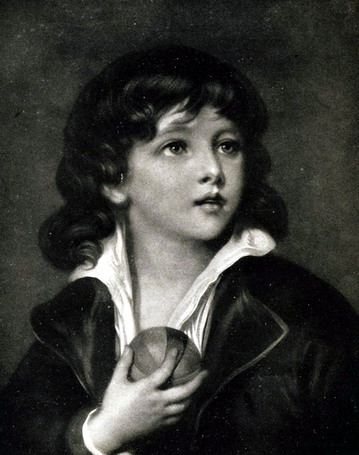
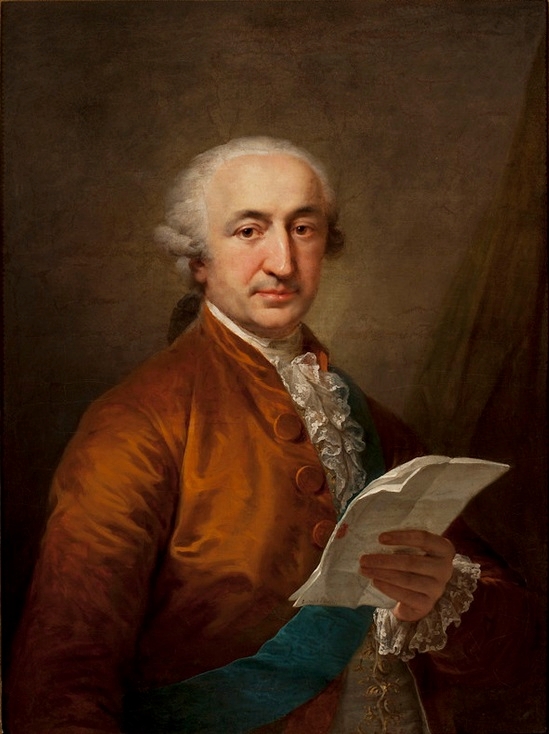
Ludwik II de Bourbon, King of Poland-Lithuania (178
Stanisław Małachowski, Grand Chancellor of the Sejm, Chairman of the Regency Council (178
--

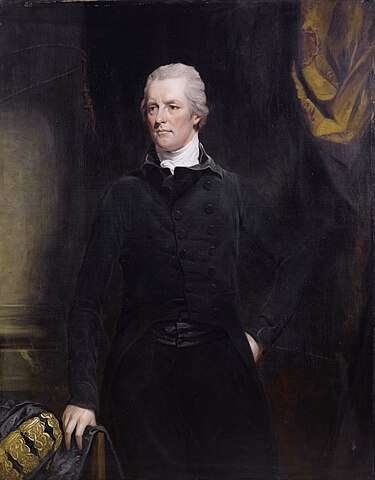
George III von Hanover, King of the United Kingdom of Great Britain (1760-)
William Pitt the Younger, Prime Minister of the United Kingdom (1783-)
--
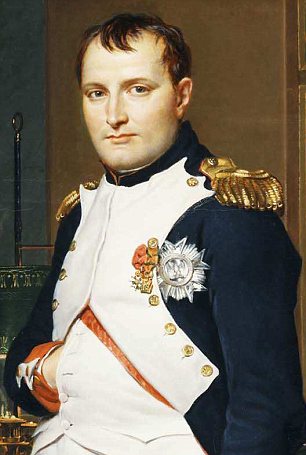
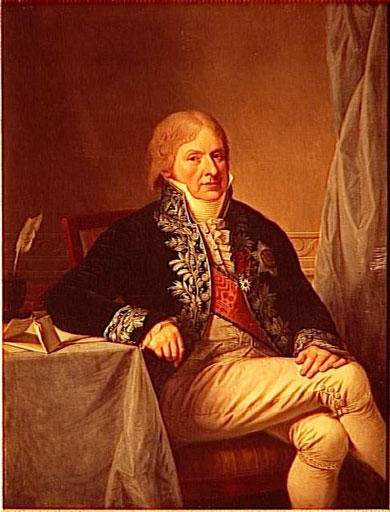
Napoleone I di Buonaparte, Augustus, Emperor of the Roman Empire (1787-)
Marzio Giotto Vespa, Tribune of the People (1789-)


Thomas Jefferson, President of Georgia (1796-)
Benedict Arnold, Deputy President of Georgia (1796-)
--


Ludwik II de Bourbon, King of Poland-Lithuania (178
Stanisław Małachowski, Grand Chancellor of the Sejm, Chairman of the Regency Council (178
--


George III von Hanover, King of the United Kingdom of Great Britain (1760-)
William Pitt the Younger, Prime Minister of the United Kingdom (1783-)
--


Napoleone I di Buonaparte, Augustus, Emperor of the Roman Empire (1787-)
Marzio Giotto Vespa, Tribune of the People (1789-)
Share: